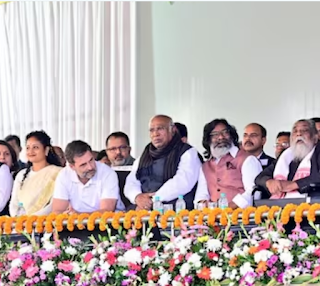Hemant Soren was sworn in as Jharkhand’s Chief Minister for the fourth consecutive term on Thursday, marking a significant milestone in his political career and the state’s governance history. The swearing-in ceremony, held at Ranchi's iconic Morabadi Ground, was transformed into a grand political spectacle, symbolizing Opposition unity under the INDIA bloc. Governor Santosh Kumar Gangwar administered the oath of office to Soren, who now assumes leadership of the state’s government amidst expectations of fulfilling an ambitious developmental agenda.
The event drew a constellation of INDIA bloc leaders, including Congress stalwart Rahul Gandhi, the Leader of Opposition in Lok Sabha, along with senior leaders from allied parties such as the Rashtriya Janata Dal (RJD), CPI-ML, and others. Their presence was a calculated move to reinforce the bloc’s national political strategy while celebrating the coalition’s emphatic victory in Jharkhand. The display of solidarity also served to project a united front against the BJP-led National Democratic Alliance (NDA) in the lead-up to the 2024 general elections.
This latest electoral success comes as a remarkable comeback for Soren, who faced significant political and legal hurdles earlier this year. His arrest by the Enforcement Directorate (ED) in connection with a money laundering case linked to an alleged land scam had cast a shadow over his leadership. However, his resilience and strategic campaign, supported by the INDIA bloc’s united front, turned the tide in his favor. Defying the predictions of exit polls, the coalition, led by Soren’s Jharkhand Mukti Morcha (JMM), secured a resounding 56 seats in the 81-member Assembly, reaffirming public faith in his governance and the alliance’s vision for the state.
Following his swearing-in as Jharkhand’s 14th Chief Minister, Soren now faces the challenging task of forming a cabinet that reflects the coalition’s diverse composition while adhering to constitutional guidelines that limit the number of ministerial positions to 12, including the Chief Minister. To maintain harmony within the coalition, a formula of proportional representation is expected to be applied, likely allocating one ministerial berth for every four MLAs. Based on this framework, the Congress, which performed strongly in the elections, is projected to secure four cabinet positions. The Rashtriya Janata Dal (RJD), with a smaller representation, is likely to claim one berth, while the left parties, represented by two MLAs, are also expected to be accommodated with a single position.
Strategic allocation of key portfolios will be critical in ensuring that all coalition partners feel adequately represented and empowered. Reports suggest that the JMM will retain influential ministries such as Home, Finance, and Rural Development, while the Congress may secure Health, Education, and Social Welfare. The RJD and left parties are likely to negotiate for portfolios that align with their core political agendas.
Soren’s priorities in his new term are expected to include addressing unemployment, enhancing rural infrastructure, empowering tribal communities, and improving healthcare and education systems in the state. The coalition’s manifesto, which emphasized sustainable development and social justice, will serve as a roadmap for governance.
The swearing-in ceremony and the INDIA bloc’s strong show of unity at the event have broader political implications. The leaders’ attendance underscored their commitment to presenting a cohesive Opposition at the national level, leveraging regional successes like Jharkhand to bolster their credibility and momentum. For Soren, this term represents an opportunity to consolidate his leadership, deliver on his promises, and strengthen the alliance’s foothold in the state while contributing to the bloc’s vision for national politics.



